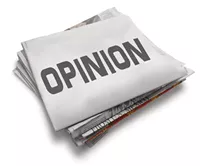Fifty Shades of Feminism
Erotic juggernaut is not the end of equality or morals
By Stephanie LauritzenThe Fifty Shades of Grey movie trailer debuted recently, and as it turns out, when it comes to opinions about BDSM erotica, no one is vanilla.
Right-wing conservatives are wailing about the degeneration of American religious and moral values while simultaneously crowing over the "failure" of feminism, since the success of Fifty Shades clearly indicates that women really don't want equality; we want hot guys to take advantage of us in elevators.
Standard-issue left-wing feminist liberals (hello, my people) are upset because the lovers in Fifty Shades, Ana and Christian, demonstrate a slew of problematic behaviors reflective of a deeply patriarchal society. What some see as passion and romance, many view as misogynistic abuse and degradation. I've seen a lot of criticism suggesting that "good" feminists should boycott all things Fifty Shades so that our 70 cents to a man's $1 doesn't go toward maintaining troubling assumptions about female sexuality.
In a way, it's beautiful that all it takes to unite the friends of Fox News with their sworn enemies (bra-burning feminists) is poorly written fanfiction. My inner goddess—ahem, I mean English teacher—is totally celebrating this as a win for humanity. Regardless of their position on the socio-political spectrum, everyone seems to agree that there's something wrong with liking Fifty Shades of Grey.
However, the universal outrage is where things get tricky for me. Unlike Ana, my thoughts aren't dominated by an insane inner goddess. Instead, I'm driven by an inner contrarian who comes out any time people say I shouldn't like or support something in order to be a good Christian/feminist/human/etc.
Fifty Shades of Grey didn't rise to international success because women secretly want to be dominated by men who tell them what to do in and out of the bedroom, therefore negating feminism. Suggesting that feminists are lying about their desire for equality because they secretly read BDSM erotica on their Kindles is like suggesting religious people are lying about their devotion to God when they visit a doctor who cures them with science. Sex, in any form, sells, and antibiotics cure infections, regardless of one's relationship with feminism or religion.
And it's also entirely possible that women enjoy Fifty Shades because it focuses exclusively on a woman exploring her sexuality despite the fact that everyone around her thinks she's weird. The world simultaneously preaches that "sex is bad" while using female bodies as a marketable commodity, and popular culture devotes nearly all its energy to exploring a male sexual experience. That's why films showing female sexual experiences are labeled "explicit" while male sexuality is routinely deemed PG-13. Even movies and literature geared specifically toward women talk about sex through a male lens, hence the variations on "How to please your man in 17,348 ways" and "He's just not that into you" that we see repeated ad nauseam. For a book to focus on female sexual identity, however problematically, represents a small but important cultural shift in how we talk about women and sex.
While it's easy for me to dismiss the "failure of feminism" and "sex is bad" arguments, it's hard to identify what, exactly, renders one a good or bad feminist. I recently took Buzzfeed's "Are You a Bad Feminist?" quiz, which deemed me "problematic." Probably because I wear a lot of pink and like Beyoncé. And yet, aren't we all "problematic" in our support of social causes? From pro-public-education parents who send their kids to private schools to pro-choice evangelical Christians, it seems that the label "problematic" sometimes indicates nuanced thinking, not a failure to advocate for our cause.
So before anyone sifts through the ashes of my burned bras in order to take away my laminated Feminist Card, I recognize that, despite the sex-positive undertones, Fifty Shades of Grey is still a deeply troubling narrative for men and women. It uses the guise of "kinky" sexuality to promote what appears to be an abusive relationship between a psychologically and physically stronger man over a younger and very impressionable woman. Christian doesn't just want to experiment with control in the bedroom; he wants to control every aspect of Ana's life, including who she sees and talks to, and even what she thinks about. It's concerning that society doesn't view egalitarian relationships between consenting adults as exciting or sexy, and that we continue to equate passion with drama and violence.
I think the conversations about what bothers people regarding the Fifty Shades franchise are important and necessary. But I don't think those conversations can end productively if we use Fifty Shades as a measuring stick for feminism. Just like claiming a single movie represents the "failure" of feminism, labeling the people embracing the Ana and Christian narrative as "bad feminists" doesn't do the fight for gender equality any favors.
Feminism works by making the world better for everyone, regardless of gender, and regardless of whether they think they need it or not. The success of feminism depends on a theory of inclusion, not exclusion, and by recognizing the (don't hate me) shades of gray in individual approaches to feminism, sexuality and popular culture.
More by Stephanie Lauritzen
-
Survey Follies
Improving education shouldn't rely on first proving that teachers are ineffective at doing the impossible
- May 6, 2015
-
Teach Tolerance
It's healthy and good for students to see that multiple viewpoints can exist in the same space
- Apr 1, 2015
-
Motherhood Is Not a Career
Giving it an imaginary salary is damaging to all women
- Dec 10, 2014
- More »
Latest in Opinion
Readers also liked…
-
Russian Army Conscripts Asking, 'Where's Our Underwear?'
Smart Bomb: The completely unnecessary news analysis.
- Dec 21, 2022





